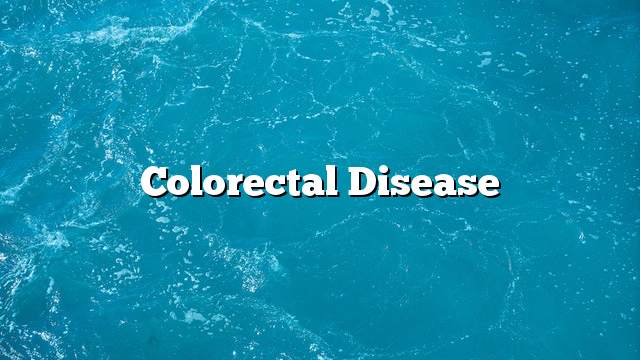Colorectal disease
Colorectal disease is caused by a severe inflammation of the digestive system, which causes many infections spread to all organs and organs of the body including the intestine, colon disease affects the immune system makes it unable to stand up to diseases and viruses that attack the body.
A colon is a group of intestines that transport the body’s waste and deliver it to the rectum
Colorectal disease is the result of irritation in the colon or intestine
Colon Sections
Rising colon: It is located in the abdominal cavity on the right side of it.
Transverse colon: The transverse colon extends from the right ventral cavity to the corresponding side.
Downstream colon: A colon that reaches the left side of the abdominal cavity
Colorectal colon: This type of colon is determined by its function in the process of absorption of water and salts taken from the wastes that accumulate from the remnants of food and colon colon also strengthen the processes of constriction and colonization in the colon so as to deliver waste easily and easily to the rectum.
Types of colon disease
Colorectal disease has several types according to the type of inflammation it affects:
Ulcerative colitis: It is called the wounds and ulcers that occur to lining the colon and inflammation of severe and painful to the colon as a result of the exposure of the patient to many of the psychological stresses and stress and severe pressure on the nerves.
Ulcerative colitis. Its harmful effects and harmful effects are mitigated by taking medicines that the doctor. If the results are minor, the patient will perform an inflammation.
Amoebic colitis: This infection is caused by the consumption of contaminated foods and beverages that cause the formation of amoebic parasites and bacteria in the colon. Those infected with this type of infection are exposed to severe diarrhea and high temperature of the body, exposure to severe infections cause strong ulcers And acute incontinence called peritonitis
_ Peritonitis: which results from the injury of the membrane lining the abdominal cavity.
The occurrence of convulsions and abdominal cramps of the symptoms of peritonitis
Peritonitis can be treated without the need for surgery unless it causes a puncture, and the cases in which the owner resort to surgery are rare.
Mucous colitis: inflammation of the wall of the colon with many strong muscle spasms, and who suffers from colitis mucus associated with the process of defecation and removal of the bowel mucus exit without bleeding.
A patient with mucosal colitis has very severe abdominal pain.
Symptoms associated with colon infection
_ Feeling tired and tiredness severe
· Severe cramps in the intestines
_ The feeling of not wanting to eat and this leads the patient to lose weight in a strong and fast.
_ major depression
_ stomach pain
_ Occurrence of constipation sometimes, as the condition associated with colon patient diarrhea.
_ The feeling of not taking the process of taking out the stool fully, but feel that need to defecate again.
_ Feeling bloating
Difficulty digesting food
_ A sense of acidity in the esophagus as a result of food reflux
Swelling and redness of the colon tissue are also symptoms associated with the inflammation of the colon
